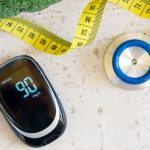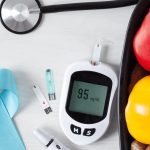For those living with diabetes or concerned about their risk, understanding HbA1c is crucial. But what exactly is it, and why is it the gold standard for measuring diabetes control?
What is HbA1c?
HbA1c, also known as haemoglobin A1c, reflects the average levels of glucose (sugar) in your blood for the last two to three months. Imagine your red blood cells as tiny mail carriers, constantly delivering glucose (sugar) throughout your body. HbA1c reflects how much sugar has attached itself to these carriers over the past 2-3 months. The higher the HbA1c level, the more sugar has been clinging to your red blood cells, indicating potentially higher average blood-sugar levels.
HbA1c levels and their meanings
- Normal: An HbA1c level below 39 mmol/mol (5.7%) indicates normal blood sugar control.
- Prediabetes: Levels between 39 mmol/mol (5.7%) and 48 mmol/mol (6.4%) suggest prediabetes, a condition where your blood sugar is higher than normal but not yet high enough for a diabetes diagnosis.
- Diabetes: An HbA1c of 48 mmol/mol (6.5%) or higher typically indicates diabetes, depending on other factors.
Read More: Diabetes vs. Prediabetes: Everything you need to know
Why it is important to check your HbA1c levels
Chronically high blood-sugar levels can lead to serious health complications like heart disease, nerve damage and vision problems. HbA1c serves as an early warning sign, allowing you and your doctor to take action before complications arise. Regularly monitoring your HbA1c empowers you to:
- Track your progress: Monitor the effectiveness of your diabetes management plan.
- Identify potential issues: Early detection of prediabetes allows for lifestyle changes to prevent progression to diabetes.
- Make informed decisions. Results help guide treatment adjustments and lifestyle modifications for optimal blood-sugar control.
If you’re considering monitoring your HbA1c, there are convenient and accessible options available. DocHQ’s Diabetes Check is an easy and affordable way to test your HbA1c levels from the comfort of your home.
How to lower your HbA1c levels
The good news? You can actively lower your HbA1c through healthy lifestyle changes:
- Embrace a balanced diet: Focus on fruits, vegetables, whole grains and lean protein while limiting processed foods, sugary drinks and unhealthy fats.
- Move your body: Regular physical activity, even brisk walking, helps your body use insulin more effectively and lowers blood-sugar levels.
- Maintain a healthy weight: Losing even a small amount of weight can significantly improve your HbA1c.
- Manage stress: Chronic stress can elevate blood-sugar levels. Practice relaxation techniques like yoga or meditation to manage stress effectively.
- Don’t skip medications: If prescribed, adhering to your medication regimen is crucial for managing diabetes and lowering your HbA1c.
Read More: Ways to lose weight and keep diabetes at bay



